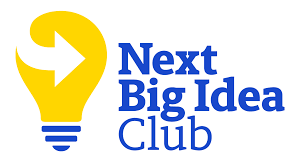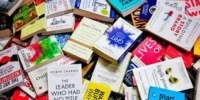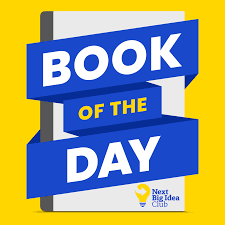
My book, Peacebuilding Starts at Home, will go into production by the end of this week. That means that I will now have more time to devote to actual dot connecting work, including this newsletter, which will now come out more frequently, including one more time this week when I talk about Convergence Policy’s annual conference which I just got back from.
Stay tuned for more information about the book and how we plan to use it to build a Peacebuilding Starts at Home community in real life and not just in its pages.
The Next Big Idea Club
In 2018, I somehow heard about the Next Big Idea Club.
In those early days, membership got you copies of two new non-fiction books each quarter. The titles would be chosen by Adam Grant, Susan Cain, Daniel Pink, and Malcolm Gladwell. Since I had already read and liked book by all but Cain, I figured they would pick good books by rising stars whom I might not have heard about otherwise. As someone who reads two nonfiction books a week, I was intrigued, especially since the club would also donate copies of the book to high school students in underserved communities. That feature has disappeared in large part because they had trouble figuring out who to send those books to. I later learned that the club was founded by serial entrepreneur, Rufus Griscom, whose self-deprecating humor puts mine to shame.

So, Gretchen and I joined and got in the habit of eagerly awaiting the arrival of the blue shoe box like packages that came every three months. Even if the club only involved the books, it would have been one of the best investments I ever made. I would have found some of the titles on my own, like Amanda Ripley’s High Conflict. But, I “met” all sorts of authors whose works I might not have encountered otherwise, including one that arrived in my most recent package, Emil Zaki’s Hope for Cynics which actually revolves around his relationship with Emile Bruneau whom I worked with on projects involving neuroscience and peacebuilding before his premature death.

More Than Books
Since then, they have expanded the club in a number of ways, all of which are designed to reach more people. Four of them have been helpful for me. All are accessible from its increasingly user friendly web site
That starts with its regular recommendations. In the early days, it only told members about the book that Grant, Gladwell, Cain, and Pink chose. Then, to my delight, they published the short lists of books that didn’t make the final two in any given quarter.

Even if you have a great bookstore to go and browse in as I do (Kramerbooks is around the corner from my office), having a list of newly published books in my field(s) has proved invaluable. And costly. Thanks to the Club, the pile of unread books on my Kindle keeps getting bigger and bigger.
The club’s staff has also realized that not everyone has time to read as much as I do, which led them to two more innovations.
The first are Book Bits and the daily Book of the Day which are fifteen minute summaries of books that are presented by the authors themselves. Typically, each bit revolves around the five key points the authors think they are making. This feature is also available at a lower cost that full club membership and has undoubtedly contributed to the growth of the club to, I gather, about 8,000 total members.

Early on, Griscom and others on the staff started doing podcasts with the authors of the books-per-quarter and others that didn’t make the cut. One appears most weeks. This week, Rufus will be interviewing Derek Thompson, co-author of Abundace.
I listen to most of them while on my daily walk. Sometimes I end up buying the book as I did with Will Storr’s new book, A Story is a Deal. Sometimes I don’t as happened recently after listening to one on cryptocurrency. Still, I learned a lot in the hour I spent listening
I won’t be listening to the podcast with Thompon with a possible purchase choice in mind. I’ve already read and loved the book.
Instead, my Rotary club uses some of the podcasts instead of full books for its reading club. While I obviously think people should read whole books, most of my fellow Rotarians don’t have time to work through more than a chapter or two a month. We’ve tried a few podcast-based discussions, and have two more lined up—Abundance and one in which Griscom and Adam Grant discuss the latter’s Give and Take twelve years after it was published.
Finally, the club just launched its Author Insider program which is aimed at people like me who are working on non-fiction books of their own. It will have regular sessions with prominent authors and begin building a community of authors who can learn from each other.
Although it isn’t cheap, the program will be worth every penny.
At its first meeting, Steven Johnson (one of my favorites) talked about AI-based software he has developed at Google, Notebook.LM, which it describes as your personal research assistant. Unlike the most widely used AI tools, Notebook only works with material you explicitly upload to and is based on software tools that Johnson has been developing over the years to help him pull together his research notes.
Since Peacebuilding Starts at Home is almost done (it will go into production at the end of the week), I didn’t need the research assistant part of Notebook.
I did, however, use it to help me find glitches in the prose, identify areas that needed improvement, and the like.
More importantly, I was able to take advantage of two features that are actually rather humdrum but will actually save me a lot of time. It created a draft study guide and set of FAQs which I will turn into final text in about an hour each once the manuscript comes back from the copy editor.

But the really cool thing Network.LM can do is turn whatever you give it into a podcast. So, I submitted the penultimate draft that took me the better part of two years to write. Fifteen minutes later, Grechen and I started listening to two human sounding voices having a conversation about my book.
It was amazing. Other than mispronouncing Marcel Proust’s name, the AI was brilliant. It even made some of my funny bits funnier.
Bottom line. I would never have experimented with Notebook.LM if I weren’t part of the Next Big Idea Club.
Can It Be More of a Club?
It has been a huge success. I haven’t asked the team how many members there are, but a few minutes of stealthy internet research using my favorite search engine Ecosia suggested that it is close to 10,000. A few minutes more with Perplexity showed me that Griscom and his team have been able to raise significant start up capital.
So, that leaves me returning to a phrase I used to describe one of the organizations I discussed in my own book. The Next Big Idea Club might be the best kept secret in the literary world. Next to no one I know has even heard of it. And while 10,000 is a lot of members, it’s just a drop in the clichéd bucket of non-fiction readerst.
What’s more, I ‘d love to see it become more of a club in which its members form a real community. Which attracts more members. And gets some of members to do other things together.
Like start building peace at home? Or thinking about abundance? Or give cynics hope: Or get along with everybody (tomorrow’s members only online discussion)?
Now that my own book is all but done, I’ve volunteered to elp the team figure out how to do it.
In the end, I only have one problem with the club. If you don’t think twice about buying books, it can become an expensive habit.
But that’s a quibbling criticism of an organization that is doing well despite the difficulties that publishers in general and long form journalism projects, in particular, are having these days.
Even more importantly, Rufus and his team are fun. And educational. And doing some good in the world.
My Next Contribution
One of the few downsides of membership for me is that I often buy the books that arrive in those blue boxes on my Kindle before the blue boxes arrive which means I am getting a hard copy of a book I already own (thanks to their recommendation lists).
Now, I’ve found a use for them. Gretchen and I are about to downsize into a new condo that is even closer to our grandkids and the Metro. The development will also have a residents’ lounge with coffee maker and comfy chairs. The complex’s developers have suggested using my surplus Next Big Idea Club books as the core of a de facto lending library.
And, couldn’t I start a book club based on Next Big Idea Club books and therefore do my tiny part in turning it into more of a club?
Now, if I can only convince Rufus and the gang to make cute “Gift of the Next Big Idea Book Club” book plates to put on the inside cover.
I seem to remember that someone gave me things like that as a bar mitzvah present….
The views and opinions expressed in this article are those of the author and do not necessarily reflect the official policy or position of the Alliance for Peacebuilding or its members.
